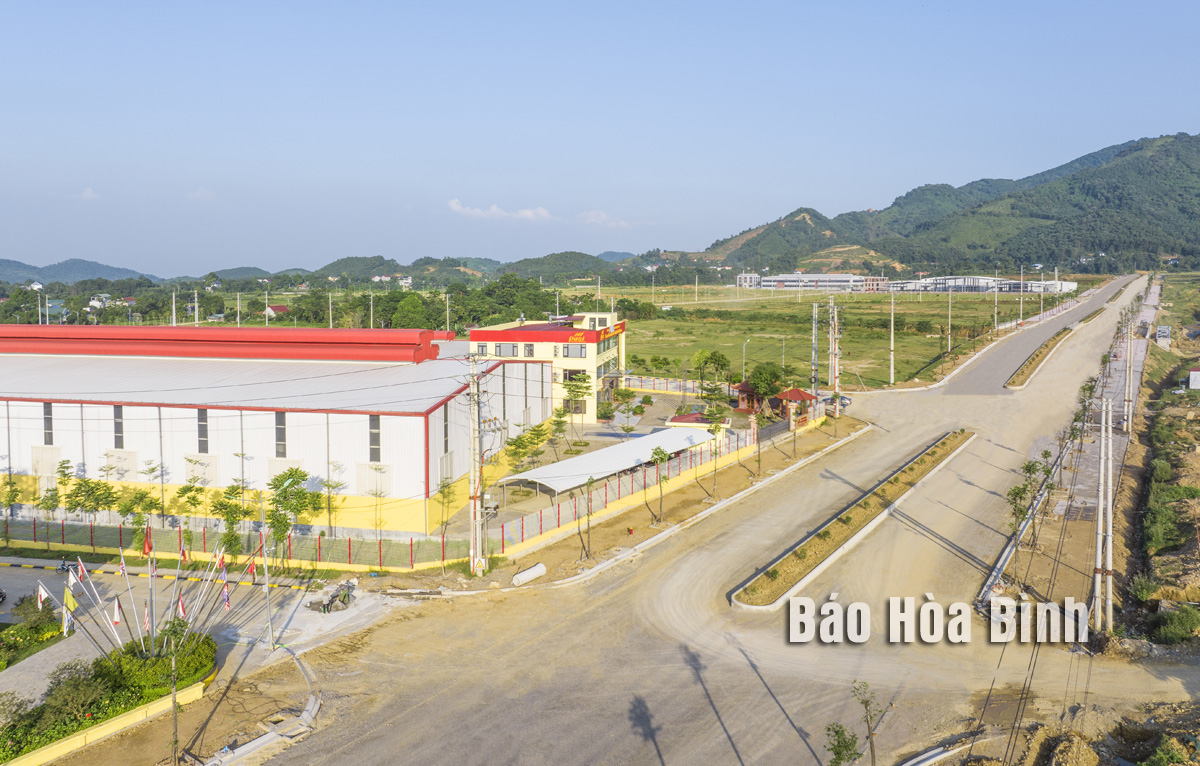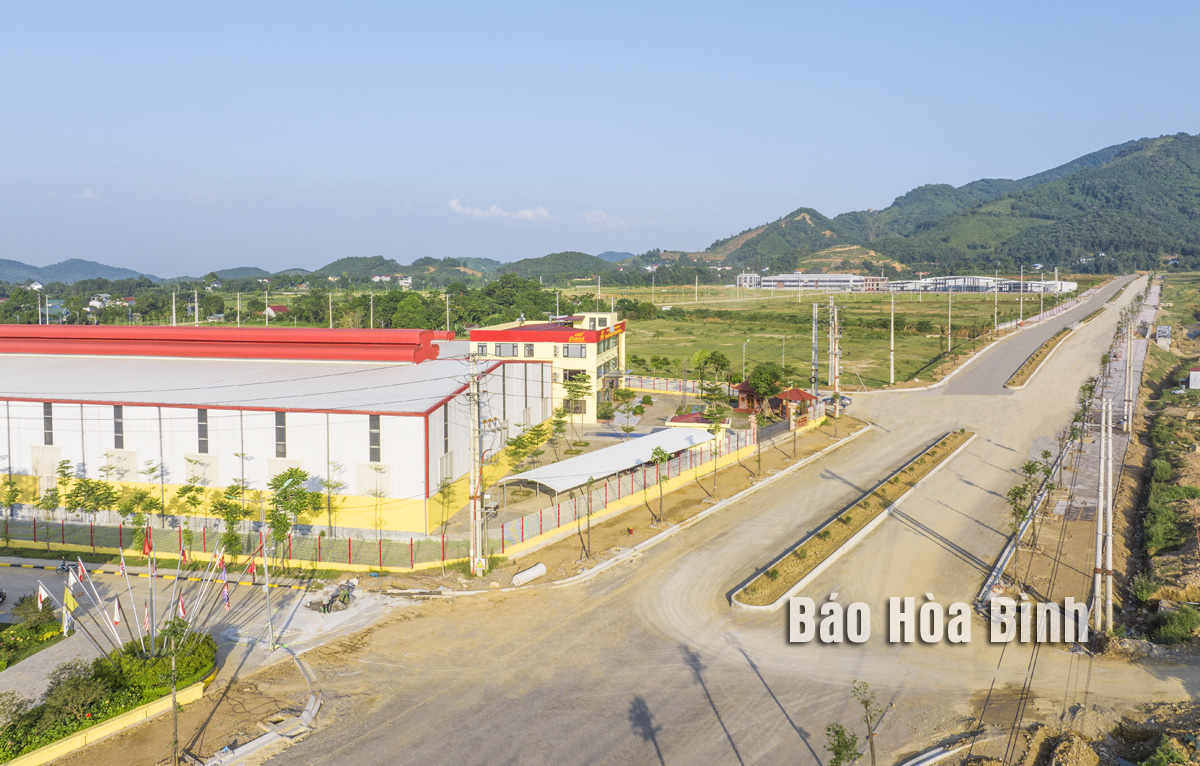
A revolution is unfolding in Hoa Binh province, with broad roads stretching across the terrain, industrial zones humming with machinery, organic vegetable fields rolling out in vibrant green expanses, and tourism destinations emerging, rich with cultural identity.
The determination and unity of the Party committees and
administrations at all levels and the local people have created foundational
changes in the province’s economic restructuring and renewal of the economic
growth model.
Hoa Binh
province has paid due attention to developing industrial parks and clusters. In
the Photo: The Tien Tien Industrial Cluster in Quang Tien commune, Hoa Binh
city.
The journey began in 2016 when Hoa Binh worked
to restructure its economic model. Four years later, the results were
promising, with economic scale rising by 41%, to reach nearly 52 trillion VND
(over 2 billion USD) in 2020, and per capita regional domestic product (GRDP)
touching 60.3 million VND.
Resolution
No.09-NQ/TU sets bold roadmap for economic development
The Standing Board of the provincial Party’s
Committee issued Resolution No.09-NQ/TU on December 31, 2021, a comprehensive
blueprint for local economic restructuring. The ambitious plan aims to bring
Hoa Binh's economic performance up to the national average by 2025, with specific,
transformative targets.
Key objectives include achieving an average
annual GRDP growth of 9%, increasing labor productivity by 8% annually, and
reducing poverty rates by 2.5-3% each year for 2021-2025.
The province set its sights on attracting 280
domestic projects worth over 120 trillion VND and 30 foreign direct investment
(FDI) projects valued at some 1 billion VND.
Under the resolution, various large-scale
projects and plans have been brought into full play, with the one on
restructuring the local economy in tandem with the renewal of economic growth
motive aimed at improving the efficacy of investment allocation and use,
developing industries and projects on the basis on the local strengths and
those with high added value and competitive edge, and enhancing labour
productivity, among others.
Capitalising on the Government’s support, the
province has issued various special policies to attract investments and
mobilise resources. Besides, the national target programmes on building
new-style rural areas and sustainable poverty alleviation have been integrated
with the economic restructuring efforts.
The provincial planning for 2021-2030 with a
vision to 2050 was greenlighted by the Prime Minister in late 2023. It looks to
inclusive and harmonious development with four pillars of processing and
manufacturing industry, clean and organic agriculture, tourism, and development
of satellite urban areas in tandem with the preservation of local ethnic
groups’ culture. This is the guiding principle for the province to restructure
its economic sectors in an effective and sustainable fashion.
A quiet yet powerful transformation unfolds as
those used to hillside farms and kitchen duties now set aside their routines to
learn to change. The entire rural landscape seems to awaken from years of
clinging solely to farmlands. Now locals are gearing towards the future with
new hopes. However, even with determination and strong consensus, the
province’s economic restructuring journey is not without challenges. What are
they and what has Hoa Binh done to overcome the obstacles?
To be continued
According to data from the Hoa Binh Provincial Party Committee, the industrial production index for the first six months of 2025 is estimated to have increased by 20% compared to the same period last year. This marks the highest year-on-year growth rate for this period since 2020.
In the first six months of 2025, Hoa Binh province’s export turnover was estimated at 1.145 billion USD, marking an 18.11% increase compared to the same period in 2024. Import turnover was estimated at $ 804 million, a 17.15% increase, which helped the province maintain a positive trade balance.
The lives of the ethnic minority farmers in Tan Lac district have gradually improved thanks to the new directions in agricultural production. This is a testament to the collective strength fostered through the professional associations and groups implemented by various levels of the district’s Farmers’ Union.
With the motto the "product quality comes first,” after nearly one year of establishment and operation, Muong village’s Clean Food Agricultural and Commercial Cooperative, located in Cau Hamlet, Hung Son Commune (Kim Boi district), has launched reputable, high-quality agricultural products to the market that are well-received by consumers. The products such as Muong village’s pork sausage, salt-cured chicken, and salt-cured pork hocks have gradually carved out a place in the market and they are on the path to obtaining the OCOP certification.
In the past, the phrase "bumper harvest, rock-bottom prices" was a familiar refrain for Vietnamese farmers engaged in fragmented, small-scale agriculture. But today, a new spirit is emerging across rural areas of Hoa Binh province - one of collaboration, organisation, and collective economic models that provide a stable foundation for production.
Maintaining growing area codes and packing facility codes in accordance with regulations is a mandatory requirement for agricultural products to be eligible for export. Recently, the Department of Agriculture and Environment of Hoa Binh province has intensified technical supervision of designated farming areas and packing facilities to safeguard the "green passport" that enables its products to access international markets.



